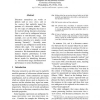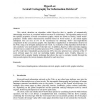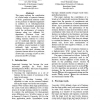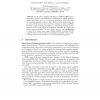142 search results - page 7 / 29 » Disambiguating Highly Ambiguous Words |
COLING
1996
13 years 8 months ago
1996
This paper addresses the issue of word-sense ambiguity in extraction from machine-readable resources for the construction of large-scale knowledge sources. We describe two experim...
ACL
2009
13 years 5 months ago
2009
Discourse connectives are words or phrases such as once, since, and on the contrary that explicitly signal the presence of a discourse relation. There are two types of ambiguity t...
CSL
2004
Springer
13 years 7 months ago
2004
Springer
This article describes an algorithm called HyperLex that is capable of automatically determining word uses in a textbase without recourse to a dictionary. The algorithm makes use ...
COLING
2002
13 years 7 months ago
2002
This paper explores the contribution of a broad range of syntactic features to WSD: grammatical relations coded as the presence of adjuncts/arguments in isolation or as subcategor...
CORR
2000
Springer
13 years 7 months ago
2000
Springer
In this paper Schapire and Singer's AdaBoost.MH boosting algorithm is applied to the Word Sense Disambiguation (WSD) problem. Initial experiments on a set of 15 selected polys...




